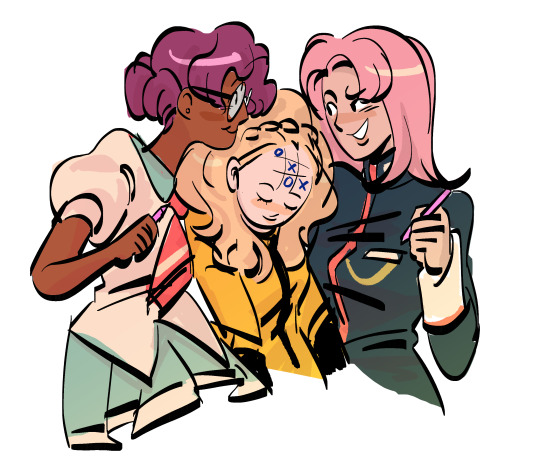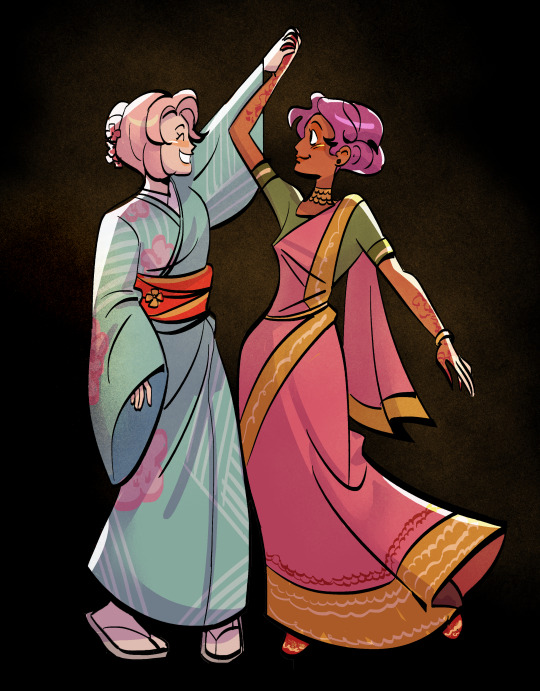Text
I cracked the fucking chainsaw man code. the apocalypse is coming because humanity has become so cruel, they're becoming the devils and the devils are becoming the opposite of their original nature (aka human)
just looking at the horsemen for example:
- conquest wanted to relinquish all her control via getting eaten by chainsaw devil.
- war is learning what genuine bonds and love are, smth that goes against the concept of war
- famine is in love with human food and is always gorging. this one is pretty obvious
- and finally, as a pochita-is-part-of-death believer, death craving love and affection and simply wanting denji to experience the joys of life aAAAAAAAA
even aging seems to want to stop aging by wanting chainsaw to eat it. all devils primary instinct should be to cause human suffering and we are seeing the change because the balance has tipped.
behind makima was a human organization that treated human life as resources to be expend. there is a reason we see the presidents of the USA and Japan offer devils the lives and body parts of their citizens. behind every devil deal is a human who chooses to sacrifice others for their own gain.
humans were never meant to become so destructive to themselves and that's why the force of nature instinct in devils is getting fucked up. if humanity cannot find a balance with its darker side, the darkness will win and everybody dies 👍
tldr society's fucked if we just let the institutions in power get away with treating us like expendable profit machines
124 notes
·
View notes
Text

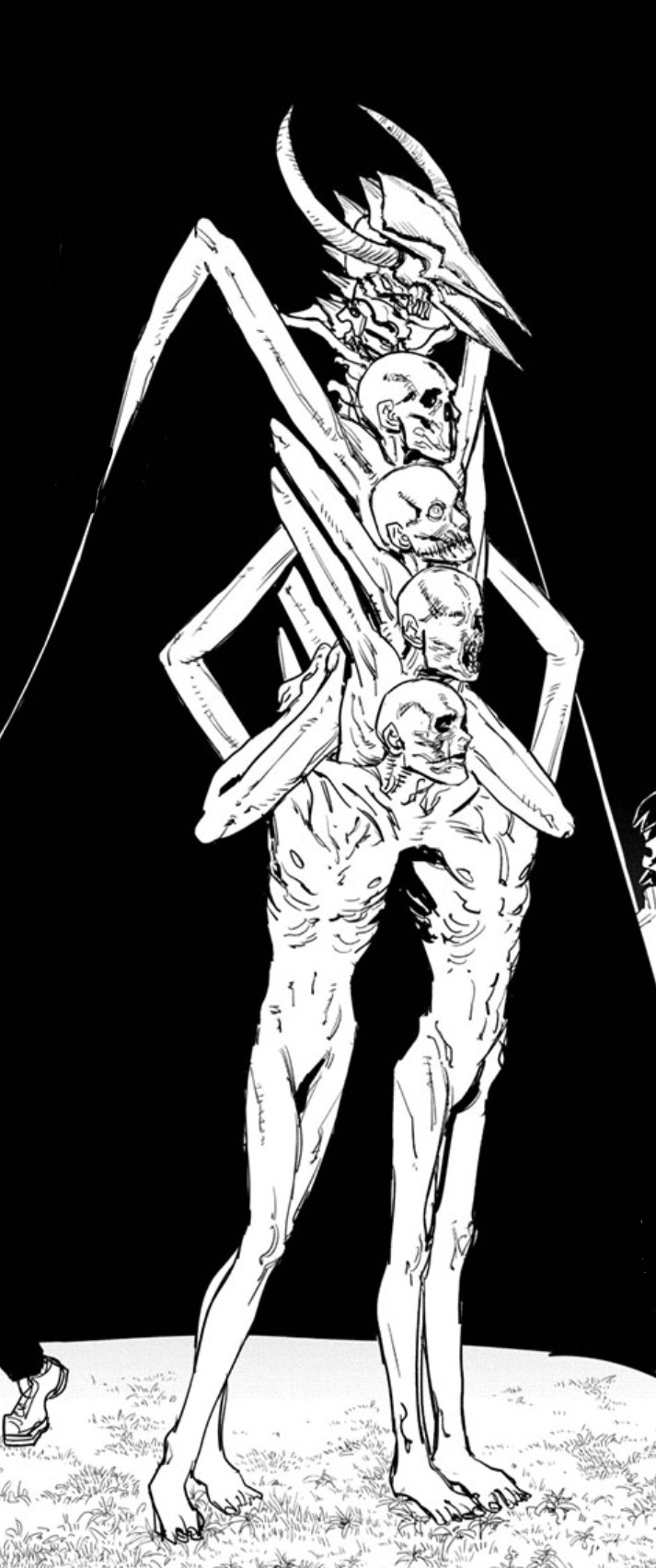
Some interesting similarities between the forms of Falling Devil and Darkness Devil.
There’s the use of multiple bodies to create a singular form, the angular shapes, the mantis-leg-like appendages, the sheer height.
These two also share very strong hand motifs, which makes sense for both of them: when it’s dark, you have to feel your way around, usually with your hands; when you’re falling, you try to grab onto something with your hands.
I’m curious to see if the other Primals look anything like these two.
3K notes
·
View notes
Text

denjis character arc rn is sooo good and fujimoto is so good at turning things like character goals on their head. denji’s gotten (almost) everything he ever wanted and it sucks. he’s gone from dreaming of a normal life in part 1 to feeling so empty when a normal life is all he has in part 2. it seems like theres an element of him feeling like he’s betraying himself and his goals and everything he enjoys in his normal life if he admits he wants more, but the normal life in his mind was the idealized daydream of a neglected child and the real thing is not fulfilling for him. he never was normal & normal doesn’t cut it for him, and im looking forward to seeing how he comes to terms with all of this.
3K notes
·
View notes
Text
i love this moment, the way yoru wields the disposability of asa's body over her; the way this is followed up w/ her disposing the twig she is unable to weaponise.
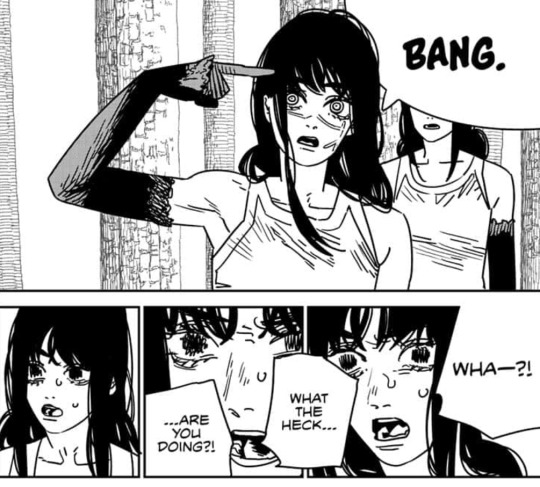
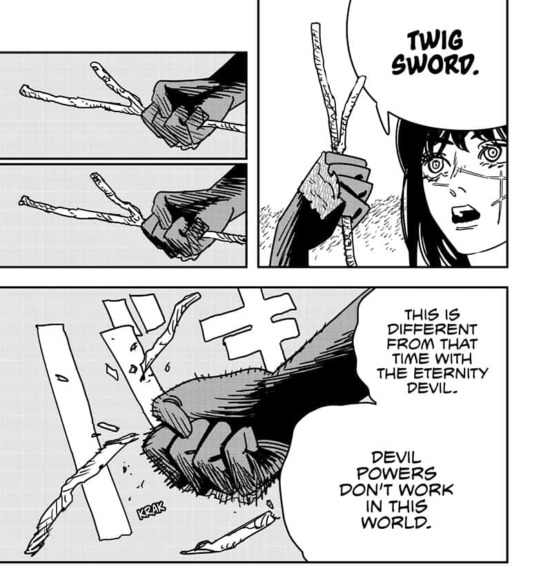
the two's relationship is crouched on such levels of intimacy & utility — & especially w/ the revelations of the last few chapters, that undercurrent of fear from early p1 hammering back home.
i'm also really normal about yoru kissing denji in the end. i think like in part obviously with prior chapters — the stress on "growing up" with the backdrop of normality made me very invested in a domestic horror-esque direction for asa & denji. factoring yoru in here makes it even more interesting: you already have this — threat of war, mother figure slash nationalist icon, who operates through possessory violence — superimposed on the body of a teenage girl. & the fact yoru articulates this through denji — her inability to possess (as part of her claim to power) in this world turns into a frustrated recourse towards sexual ownership over him (who is simultaneously internalising the idea of "punishment"). this is right at the heels of her stopping herself from hitting him because of his "stupidity."
it's intensely fucked up, especially because it re-enacts the earlier scene of SA [yoru vav asa & denji in that alleyway]. there's a dispossession of asa's own body. "hasn't this happened before?" asa & denji: thrust into the idea of "growing up", mediated on having your body taken away from you, having your body be violated without your consent, all framed into a kind of "romance", into cycles of abuse & Family well trodden, within aging's picturesque land which swallows you up into its landscape and transforms you into its history, in the end.
633 notes
·
View notes
Text
my initial post about this got flagged as mature content because of the manga panels, you can see the illustrated version here.
question: sorry to bother but could u elaborate on denji almost becoming quanxi??
ok, so we must first think of how Fujimoto writes side characters. they are there to not only enhance the world and plot but also serve the narrative in a more symbolic way too. like the three immortal brothers aren't only there for absurd dark humour but also because we need a reminder that just because this world is seeped in death, life is still precious. also, Aldo's moment of realisation and begging for forgiveness was in connection to the theme that ignorance is bliss, as in when you close your eyes to the truth for too long, reality will hurt you.
in her very first appearance, she is basically living out what Denji believes to be his dream: having sex with beautiful women.
she is a hybrid, like Denji is, though we are not exactly clear on what her devil heart is (i think Arrow or Bow devils?), and she is incredibly strong.
regarding Quanxi herself, she is willfully ignorant, believing that to be the key to her happiness. in an exchange with Kishibe in chapter 61 she says: ‘The secret to leading a happy life in this world … is that ignorance is bliss.’ and that is the core principle of her character. we can see it even in the small moments before this exchange, like when she and her girls are in a sushi restaurant and Pingtsi tells her some facts about fish, and her mood is soured by it.
during the fight with the dolls, this is the advice she bestows on him: ‘if you understand it that way, you can kill them, can’t you? Ignorance is bliss.’ she is talking about forcefully forgetting that the dollified people are still alive and can feel pain. ignoring the truth so that his conscience don’t eat away at him.
and after the international assassins arc concludes, we can see him really living it, we have plenty of key moments where Denji acts out of wilful ignorance, avoiding reality wherever possible. it even seems to work out for him.
until it doesn't. and there is a choice before him: close his eyes and continue to live under the belief that Makima is his saviour or open than and face reality.
if he were to live life as Makima planned he would've become a blind tool whose only hope of finding happiness would be to adopt ignorance in the same way Quanxi has. tools know nothing except how to be used, and it doesn't ultimately matter if they change hands (like how Quanxi is on Makima's side through the Control Devil arc), as long as they serve their purpose.
there is, of course, A LOT more to be said about these themes of ignorance vs knowledge and the balance between them in Chainsaw Man but i think i've summed the connection between Quanxi's fate and Denji's possibilities well enough here.
83 notes
·
View notes
Text
I think it’s gonna be thematically important that Pochida gave his heart to Denji to keep him alive, keep him happy and living out his dreams, while Yoru, his thematic opposite, took Asa’s body for herself purely out of necessity and uses it to insight violence. The difference between loving and owning someone and all that.
11 notes
·
View notes
Text
i think i’m gonna use this blog for all my anime meta posts and not just utena
0 notes
Text
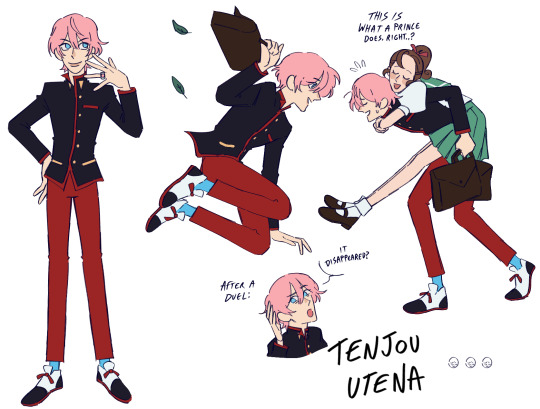





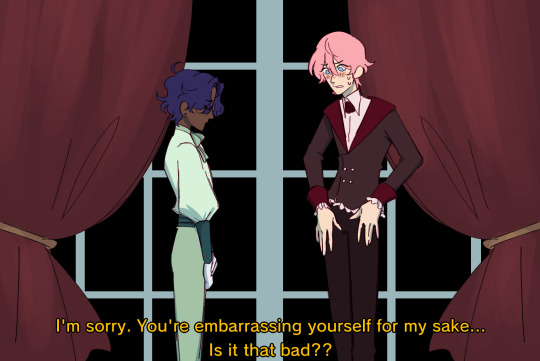

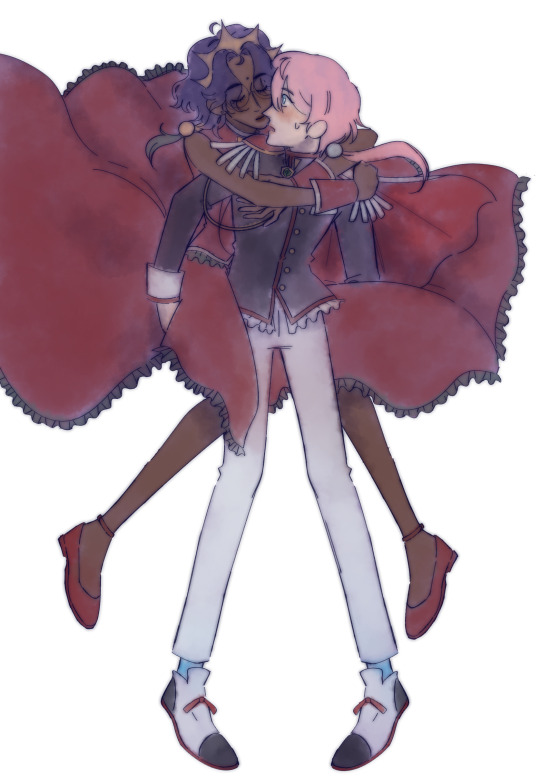
uuuuuh deeply self indulgent transmasc utenanthy au
not genderbend/swap + would prefer you not to tag it as such. them being trans is kinda what this whole shtick hinges on, and tbh it is something that is so deeply personal. transed gender is stored in the rgu
version with notes under the cut

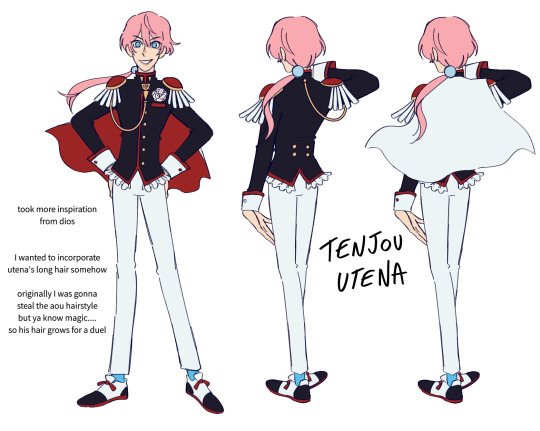

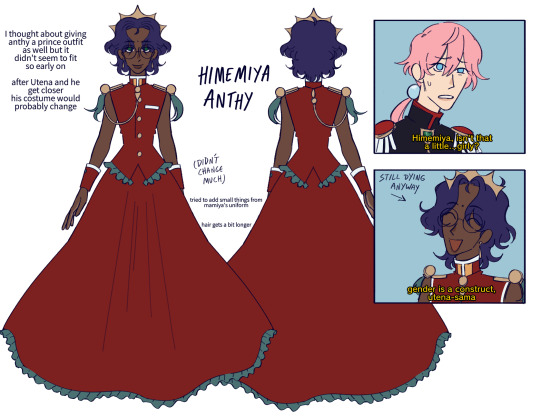
1K notes
·
View notes
Text
the fact that akio drinks utena’s tears… I always brushed it off as a bit weird and that’s it. But no. Having lost his way and his hope and will to save others, he was left with just unending suffering. And that became the thing that keeps him alive, that “feeds” him, in a way. On episode 34 - The Rose Crest, he drinks Utena tears and thanks her for it - in a way I thought was a “thanks for caring” thing.
Now I realize that he lured Utena in an effort that has later repeated in the whole series. He lures people’s through their hopes and ideals (and in little Utena’s case her fascination with his beauty and then her empathy) - things he doesn’t have anymore, so he can feed on it. And on their suffering from the failure to get what they want.
Their suffering is a an unending proof of his point, a validation of himself as he is now. Emptied of love and connection to share with others, the only thing that keeps him alive is multiplying and sharing pain
65 notes
·
View notes
Text

posting this separately cos I left it in the tags last time
53 notes
·
View notes
Text




I made some shoujo kakumei Utena redraws for blacktober 🌹
insta : cynshi // twitter : cynshi_
162 notes
·
View notes
Text



Something I still remember about Utena is how the play shows us Ohtori’s official version of what happened to Dios. An evil witch sealed The Rose Prince in a castle because she was mad he couldn’t make her a princess. But that is just what Akio believes and makes others believe too. This is also a clear instance of Akio using Anthy as a pawn that takes all the guilt. And Akio encourages this behavior from others.


This really shows how Akio’s version of events runs deep in Ohtori. What he expects from his students is to blame Anthy for everything and frame him as the victim.
Most likely he ordered Anthy to hold that play to brainwash Utena. Also doesn’t help that the moment he is alone with her, he starts talking shit about his sister and tries to lead Utena into saying Anthy is hard to deal with. Of course she doesn’t do that. Instead she admits (unconsciously) she is in love with her.
I really love this chapter so much.
(Update: I worded poorly what I meant by Ohtori’s official version of events. It´s true Akio gives his version of the story directly to Utena in the last chapters. However, I believe the play shows the version of events he wants the students to internalize and believe or as some users in the reblogs called it, a type of public knowledge he actively manipulates and twists.
I agree that the Shadow Play Girls are not under his control. My point in the original post was pointing out the shadow girls are doing a play that propagate the lies he puts out imo)
124 notes
·
View notes
Text
Nanami's cowbell and the lilies motif
TW: Spoilers of Nanami’s cowbell episode and Kanae’s duel, wacky theories.
At first I thought the cowbell brought a positive change to Nanami: she was definitely calmer than in the previous episodes and seemed to be more or less happy. However looking back at it, it’s clear she was becoming an animal her brother could manslaughter and anyone could take advantage of. This point is driven home by Anthy, who had been knitting a red jersey all the episode and triggers Nanami who, as she turned into a cow, said she felt confused. In this cow state (I can’t believe I’ve just written this) Nanami can easily be used by anyone and effectively was.
As with every good Japanese media, Revolutionary Girl Utena loves drawing parallels. Anthy receiving the swords of hatred that were meant for Akio is compared to Nanami turning into a cow.


Nanami becoming a cow would serve the same purpose as Anthy receiving the swords -they are both used as a sacrifice, a pawn that receives the hatred directed to the prince. Isn’t that the fate of the prince’s sister who can’t be rescued by her brother, so she keeps him to herself and becomes a witch? In addition to that, the parallels are powerful because they inform us how Akio truly sees his sister.
Now, let’s go with a scene that has been keeping me awake for quite some time.

This cage is your domain

And you are the lovely bird that lives in it

I want to possess this cage and everything inside of it

I would never take you out of here. Ever.

I know this is supposed to be a prophetic dream, but Nanami was right about her brother. He was not letting her go out of that cage.
Indeed, the parallels and comparisons do not end here. There’s one more drawn between Utena’s outfit and Nanami’s cowbell. They are usually brought up in many analyses of this episode so I’m leaving this take here and this one here. Suffice to say one becomes what one performs as and it’s dangerous to dress what one does not understand.
The use of flowers
This part is long and maybe confusing, but it potentially makes sense.
There are many parallels drawn between Utena, Nanami and Kanae through Madonna Lilies. At the end of the first season, the Shadow Girls foreshadow (ha!) the duel between Kanae and Utena:
Might makes right - Those who have power can do whatever they want. A clear reference to Akio
Losers are smelly old fish - Kanae, the loser of the duel, is an old thing Akio doesn’t need and is going to be replaced by Utena.
And the winner walked away - Who is the winner here? Utena, who defeated Kanae? Anthy, who got her revenge? Or Akio, who orchestrated everything and is able to get away?
Looking like a lily - If we stick to the idea that the winner is Utena, she finishes the duel looking and being like what Kanae once was: pure.
Kanae’s duel is all about performing purity and innocence. The reason she joins Mikage’s seminar is to accept she is unable to keep pretending, especially in front of Anthy who she hates. Kanae’s purity has been stolen, and she is rotten to the core (explained by the black vase). I read here that it is common for Japanese people to leave vases on top of deceased student’s desks. This works perfectly when you have the silhouettes of 100 dead kids drawn on the floor and you want to foreshadow Kanae’s death at the same time.
Returning to the idea of performing, which is a big theme in RGU, we have Kanae who performs as a white lily, pure and innocent, the epitome of a bride. Then, we have Utena who performs as a brave and noble prince. Finally, we have Nanami who performs as the queen bee who is at the same time well-liked and very mature. However, they all fail miserably in their performances: Kanae has been corrupted by Akio and holds a grudge against Anthy, Utena is not a prince at all (thanks Goodness) and Nanami is a child that doesn't fit in.
To be honest, the association between Utena and Kanae is pretty clear, but why would these lilies appear with Nanami?

From the quality of these screenshots, I can’t say for sure they are Madonna Lilies, but they have similar shape and color, so it’s safe to stick to the idea of purity and death. I know what Nanami is doing ikebana, the Japanese art of flower arrangement that symbolizes the union between nature and beauty. A few things I found is that the vase’s shape is called moribana and is probably made of bamboo, the leaves are abundant and vibrant green which announces summer and finally, quoting Wikipedia (not the most reliable source, but hey! They were the only ones who had this): “A flower arrangement made to mark a death is typically constructed of white flowers, with some dead leaves and branches, arranged to express peace.”
Should I also say that ikebana can also show the personality of who’s making it? Despite her best efforts to perform adulthood, Nanami subconsciously is aware of her purity, innocence and the fact that she’s only a child.

I don’t know if these are red roses or red camellias. If it’s the former, they would be an evident proof of love, most likely to her brother. Let’s also note there are four of these flowers and four is the infamous number associated with death. Now, if we add to the fact this scene was just before the one Nanami is making an arrangement with white lilies… Well, things are not looking good.
If it’s the red camellias I’ll tell you they used to mean a noble death for the Samurais. On top of that, they are terrible to give to those who are sick because the flowers “behead” themselves when they die. Also, red camellias are a symbol of love. But wait, what does this mean? Nanami’s blind love for Touga will be the death of her? Or is her blindingly loving Touga what will make her a cow he can manslaughter? Mmmm, the two options sound very likely. Honestly, I’m not confident in these two last paragraphs, but hey! Take it with a grain of salt and enjoy how RGU’s storytelling makes me lose my sanity and theorize my brain out.
What’s my conclusion with this part?
Kanae’s lilies symbolize her lost purity, one she performs but is unable to keep up pretending. Also, they foreshadow her death by the hands of Anthy and Akio. The association between Utena and “looking like a lily” shows she’s still pure -therefore, not performing- but will suffer Kanae’s fate if she allows Anthy to be the Rose Bride forever. Finally, Nanami, whether she wants to accept it or not, continues to be pure. She too is on her way to be killed -by Akio or Touga- as long as she continues with that cowbell on.
The other wild thought I had - considering the lilies are shown with those who win all the duels- is that if Anthy hadn’t left Ohtori, perhaps the next winner would’ve been Nanami? Of course, considering Nanami was naïve enough to still be a cow. This is an incredibly wild suggestion, but as a headcanon it is kinda cool so I’m just sharing it.
The importance of the first episodes from the Black Rose Arc
I’m guessing these episodes show the potential of every pair of siblings becoming like Akio and Anthy. The previous episode focused on Miki and Kozue, which includes Akio’s moon metaphor that Utena repeats between a scene of Kozue asking a milkshake to Miki and Akio saying he will console Anthy. Also, let’s consider every pair of siblings in this anime illustrate an aspect of Akio’s and Anthy’s relationship. Miki and Kozue show when Dios and Anthy were, generally speaking, on good terms. Everything besides them was ugly so they had their own “sunny garden” (in the case of the Anthy and Akio, it was the barn) in which they were protected from the outside world. Like Miki and Kozue, Anthy and Akio didn’t have anyone except themselves. However, the key difference with Miki and Kozue is that they both care about each other. Kozue, following her own twisted morality, pushes Miki’s predator down the stairs. Meanwhile, Miki still offers Kozue a milkshake. (Though it is important to note he has started to be more detached from her). On the other hand, Akio couldn't care less about Anthy despite her being the backbone of the system he created.
Now, Touga and Nanami illustrate Akio’s manipulation, abuse and utilization of Anthy. I think it was explained quite nicely in the previous paragraphs so there’s no need to repeat myself. What I would like to add though is that Utena was able to bring the revolution and Anthy decided to free herself so we can rest assured that the story won’t repeat itself.
Before finishing, I love Miki calling out Juri’s hypocrisy. She calls Nanami miserable for her capitalist and frivolous attitude while Juri wears long earrings, two bracelets and four rings. And the next episode is about Juri’s and Shiori’s relationship which makes Juri miserable? Damn, I love Revolutionary Girl Utena.
399 notes
·
View notes
Text
I know the scene where kozue flirts with anthy is a serious scene in the sense that it shows 1) that kozue's habit of using her sexuality to control people extends to both genders, which is important because like juri's arc it shows that the heteropatriarchy is fully capable of permeating f/f relationships as well (especially those founded on infatuation/sex rather than love and respect) and 2) it further drives home the point that people who seek to control anthy (including miki himself, who acts as a foil to kozue here) aren't actually interested in her as a person but rather in using her for her power/using her as a stand-in for someone else because of the apparently malleable nature of her personality (kozue is doing both imo)
BUT. but. the scene is also fucking hilarious. Miki is fighting for his life out here and his sister is trying to feel up his crush when he's literally standing right there and when he's like kozue what is even happening over there's she's like mind your own business miki :) "pay attention or you'll lose" gets me EVERY time
538 notes
·
View notes
Text
You know what another of my favorite things about Revolutionary Girl Utena is? That you could take anything, any symbol at all, and write if not a full essay, at least a long Tumblr post about it.
I mean aside from the obvious.of course you could write a full scholarly article on color symbolism etc but what about
Hair? From anthys tightly bound up hair, her letting it down to a reasonable length when she leaves, and the all over curls when she's seen with Akio? Jury only having her hair in controlled curls in the present day but a more loose and natural style in flashbacks. Utena's hair becoming longer more detailed and curlier in the infamous sex scene with Akio.
Earrings? Anthy is the only character to wear them as part of the rose bride dress, but other characters get them if they don one. Akio wears one earrings but Dios has none. Tougas gift to girlify Utena are earrings. Does Chuchu have the other half of akios earring?
Cooking? Holy shit the amount of times cooking is used to represent competence and adulthood. Anthy significantly can't cook . Akio can. Wakaba is learning. Nanamis last shot is her making tea.
Off that, what about food/eating? @bestnoncannonship pointed out that Anthy is never shown eating on screen. I'm not sure it's NEVER, but she certainly does so very infrequently. The episode she pointed it out on was towards the end where she takes a piece of toast Chuchu had buttered, lifts it to take a bite and then gives it back to Chuchu. Other people are frequently shown eating her food but she rarely does. Chuchu of course, is always eating.
Animals? They like Anthy, they chase nanami, kozue saves a bird.horses and princeliness. Nanamis kitten and innocence. Chuchu is NOT an animal , he's a FRIEND.
These are the ones I thought of off the top of my head but I'm pretty sure you could think of more. Just little things that pop up and are used consistently. Everything, everything is intentional. Everything has meaning.
339 notes
·
View notes

